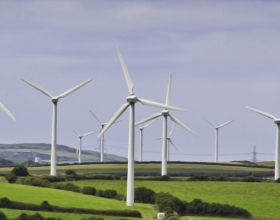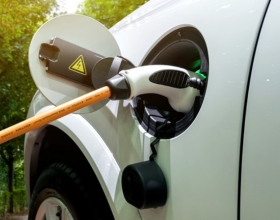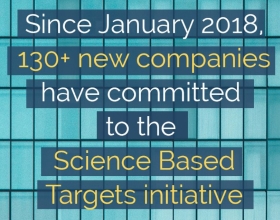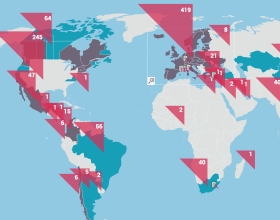Policy support will drive even greater business action
Businesses from all sectors are implementing the Paris Agreement. They are taking Paris-aligned actions, driving rapid progress in the real economy and enhancing their own ambition. Nearly 500 companies, working within both developing and developed economies, have committed to or set science-based emission reduction targets (SBT), which are aligned with the Paris Agreement goal to limit global warming to well below 2°C. Businesses acting on climate change are experiencing business benefits like growth, innovation, and quality jobs. In a 2018 survey, 79% of executives from SBT-committed companies have seen an increase in brand reputation; 52% have found that their SBT has boosted investor confidence; 63% say innovation has accelerated; and 55% have gained a competitive advantage in the marketplace. Recent results also show that RE100 companies are financially more profitable than their competitors, with net profit margins up to 7.7% higher than their peers.
With the right policies in place, companies can go even further. The first round of Nationally Determined Contributions (NDCs), even if fully implemented, will not deliver the goals of the Paris Agreement. Businesses and governments must both continue to increase their ambition and accelerate climate action. Businesses are looking to parties to build on the progress to date and step up their ambition, clearly charting a long-term strategy towards a zero-carbon future and including more ambitious targets and measures in their 2020 NDC communications. Strong implementing policies provide the clarity and confidence businesses need to inform strategic planning, drive low-carbon capital investment and technological transformation, and build resilience to climate change.
The We Mean Business coalition is pleased to submit the following recommendations to the Talanoa Dialogue for ways in which Parties can help drive the system-wide change needed to achieve the Paris Agreement goals - accelerating the shift to zero-carbon grids, zero-carbon fleets, zero-carbon buildings, zero-deforestation and 100% climate smart agriculture, while increasing resilience throughout society and ensuring a transition that promotes jobs and growth and leaves no one behind.
We Mean Business is a global coalition of nonprofit organizations working with the world’s most influential businesses to take action on climate change. The coalition brings together seven organizations: BSR, CDP, Ceres, The B Team, The Climate Group, The Prince of Wales’s Corporate Leaders Group and the World Business Council for Sustainable Development. Together we catalyze business action to drive policy ambition and accelerate the transition to a low-carbon economy. The coalition stands ready to work together with policymakers to reduce emissions and build resilience to climate impacts. We encourage Parties to strengthen policies in the following areas to spur private sector ambition on climate action.
On the eve of COP24, businesses call on national governments to take the next step:
Zero-Carbon Grids
Renewable Energy: Electrification and Decarbonization
The Paris Agreement has set a clear direction: electricity generation must be fully decarbonized by 2050, at the latest. The industrial and commercial sectors consume two-thirds of all electricity produced worldwide. This means business is playing an essential part in enabling the structural shift to clean power. 150+ of the the world’s most influential companies have committed to source 100% renewable electricity through RE100.* RE100 members are now creating demand of 180 TWh of renewable electricity annually, larger than the annual consumption of Thailand--the world’s 21st largest consumer of electricity.
Many governments are committing to fully transition to renewable energy. For example, Costa Rica sources 99% of its energy needs from hydroelectric, geothermal, solar, wind, and other low-carbon sources. And over 100 cities worldwide are now securing 70% of their electricity from renewable energy sources.
In Europe, eurelectric President--on behalf of European power companies’ CEOs--shared a long-term industry vision to the European Commission, calling on policymakers to create a stable environment for the electrification and decarbonization of Europe’s energy consumption.
*RE100 is led by The Climate Group in partnership with CDP.
To accelerate renewable energy deployment, we recommend Parties to:
- Set ambitious, long-term and credible national renewable energy targets and development plans, and prioritize renewables within a larger energy sector strategy.
- Establish a clear policy framework and communicate the administrative requirements, the financing tools that are available, and the timelines for development.
- Implement policies to support an orderly transition from fossil fuels to renewable energy to avoid stranded, or non-performing, assets.
- Enable direct participation in electricity markets for corporate buyers and renewable energy developers, including fair, transparent, and predictable costs for access to the grid.
- Establish sound and transparent tracking systems for renewable energy certificates to clarify ownership, allow businesses to make credible claims on their renewable energy use, and avoid double counting.
- In addition to government mandates, offer options for companies to source renewable energy by working with utilities or electricity suppliers to increase energy retail access and tailor energy products to meet consumer demand; consider green tariff programs in vertically integrated markets so the utility can provide renewable energy to corporate buyers directly.
- Attract direct investment in self-generation of renewable energy by establishing permitting processes, reasonable costs for transporting power (as necessary), and mechanisms to feed excess electricity to the grid.
Forward-looking businesses are already shifting their energy supplies. Unilever, for example, has 109 sites in 36 countries where the factories are supplied by 100% renewable grid electricity.
Thomas Lingard, Global Climate Advocacy & Sustainability Strategy Director at Unilever
Fossil Fuel Subsidies
Despite ongoing reforms, fossil fuel subsidies - which were estimated to be more than USD $400 Billion globally in 2017- continue to distort capital markets and slow emissions reduction efforts. Since fossil fuel subsidies distort the market toward high-carbon energy sources, removing the subsidies is critical to level the playing field for low-carbon innovation and investment.
National governments can garner three distinct benefits by removing fossil fuel subsidies: (1) saving domestic finance, (2) encouraging energy efficiency or a switch to cleaner fuels, which reduces carbon emissions, and (3) reinvesting toward more sustainable energy sources. In addition to the economies of the G20 and APEC, influential businesses called for eliminating fossil fuel subsidies. A communique, the Friends of Fossil Fuel Subsidy Reform, has been endorsed by leading organizations, including the International Energy Agency, and supported by business organizations working with thousands of companies and investors worldwide.
To level the playing field and accelerate the shift toward low-carbon investment and innovation, we recommend Parties to:
- End all fossil fuel subsidies for producers and consumers as soon as possible.
- Implement transparent pricing systems--and consider carbon pricing--to guard against the reintroduction of subsidies if and when prices fluctuate.
- Design targeted investment incentives and ease regulatory process for investments to improve industrial and national renewable energy competitiveness.
- Set strategies that prioritize renewable energy development, maintain the stability and consistency of renewable energy policies; and improve electricity grid stability to accommodate ever-growing renewable energy.
- Work together with other Parties to share lessons learned and reduce subsidies collaboratively to address competitiveness concerns.
Zero-Carbon Fleets
Accelerating the transition to electric mobility
The shift to a zero-emissions transportation future (e.g. with passenger vehicles and rail) is accelerating and unstoppable due to advancing technology, infrastructure, investment, demand, declining costs and the progressive decarbonization of electricity supply. As the transport sector is the fastest-growing contributor to climate change, accounting for 23% of global energy-related greenhouse gas (GHG) emissions, electric mobility offers a major solution in cutting millions of tons of GHG emissions per year, as well as curbing urban transport related air and noise pollution.
Virtually all of the world’s major automakers have committed to electrify part or all of their fleet. Automakers like Volvo are going even further by committing to phase out all pure gasoline cars after 2019. 20+ multinational companies have committed to accelerate the rollout of electric vehicles (EVs) and charging infrastructure through The Climate Group’s EV100 initiative, including the world’s largest international courier service Deutsche Post DHL Group and major auto fleet operator LeasePlan. Countries such as France and the UK are setting dates to end sales of all internal combustion engine vehicles, which further incentivizes the transportation sector to move toward electric mobility.
To accelerate the transition to electric mobility, we recommend Parties to:
- Set ambitious targets for phasing out fossil fuel use in transport (i.e. before 2045, phase out all internal combustion engines).
- Establish sales targets for electric vehicles, coupled with increasingly stringent emissions standards for all road vehicles to drive near-term progress.
- Introduce fiscal measures to stimulate demand for EV use and ownership (e.g. Norway, the leader in electromobility, encourages EV adoption by offering exemptions on vehicle registration tax, value added tax (VAT), road tolls, and municipal public parking fees).
- Support the deployment of charging infrastructure across different modes of transport. Facilitate the establishment of zero-emission zones in cities.
- Boost deployment of renewable energy to further enhance the benefits of electric vehicles and other modes of transportation.
- Develop public procurement policies to transition away from fossil-fuel vehicle use and increase zero-carbon transportation modes and EV use.
All parts of society – governments, business and civil society – have a role to play in the transition to the low-carbon future we want. So let’s turn climate challenges into opportunities at COP24 in Katowice.
Karol Gobczyński, Climate & Energy Manager at IKEA Group
Zero-Carbon Buildings
Energy Efficiency
Research by the International Energy Agency (IEA) suggests reducing primary energy demand and advancing energy efficient technologies will add US$18 trillion to global GDP through 2035. And, energy efficiency will reduce the cost of related decarbonization efforts by up to US$2.8 trillion.
For companies, saving energy is a sensible business decision that improves financial performance and also demonstrates commitment to staff and customers. A growing group of energy-smart companies have come together, forming EP100 (led by The Climate Group and the Alliance to Save Energy) and committing to using energy more productively to lower greenhouse gas emissions and accelerate a cleaner economy.
The Climate Group estimates that if 100 companies double their energy productivity by 2030—generating twice as much economic output for every unit of energy consumed—over 170 million metric tons of emissions could be avoided cumulatively, equivalent to taking 37 million cars off the road for a year. By setting ambitious targets and integrating energy efficiency into business strategy, leading companies such as Dalmia Cement, H&M, and Johnson Controls, are driving clean technology innovation while delivering on emissions reduction goals—inspiring others to follow their lead. From financial services and retail to automobile manufacturing and heavy industry, EP100 members are generating green growth, improving competitiveness, and banking substantial cost savings.
To increase efforts on energy efficiency, we recommend Parties to:
- Commit to improving national energy productivity by 3% per annum.
- Develop public-private partnerships to facilitate the flow of energy efficiency financing to the private sector.
- Provide government incentives such as subsidies for energy audits, technical assistance, and other mechanisms to support wide scale adoption of energy management systems (EnMS) especially within industry.
- Commit to owning, occupying or developing buildings that operate at net-zero carbon by 2030, with energy efficiency as a core component.
Our new partnerships with C40 and The Climate Group have enabled us to convene the world’s most pioneering organisations in net zero carbon buildings, and bring company CEOs, city mayors and state governors onto the same stage, committing action towards a common cause.
Terri Wills, CEO, World Green Building Council
phasing down Hydrofluorocarbons (HFCs)
Phasing down HFCs, a short-lived climate pollutant (SLCP), can avoid the equivalent of up to 80 billion tons of carbon dioxide released into the atmosphere by 2050 and up to 0.5°C of warming by the end of the century. The Kigali Amendment to the Montreal Protocol, an international treaty which countries are in the process of ratifying and will go into effect in 2019, established a timetable for countries to phase down production and usage of HFCs.
In recent years, multinational companies have committed to reduce HFCs in refrigeration and air conditioning. Businesses taking action to reduce these emissions can deliver rapid and measurable benefits in air quality, public health and food security whilst also boosting economic growth and making a key contribution to global climate change mitigation efforts. Reducing HFCs offer companies a simple and pragmatic way to bolster energy efficiency and reach climate mitigation targets. For example, in transporting agricultural products, Unilever has observed a 10% energy usage reduction by freezers that use HFC alternatives. Businesses are joining efforts through multiple collaborative initiatives, such as Refrigerants Naturally!, which includes The Coca-Cola Company, PepsiCo, Red Bull, and Unilever, to share best practices on technological advancements to phase down HFCs.
To rapidly phase down HFCs, we recommend Parties to:
- Ratify and accelerate implementation of the Kigali Amendment to the Montreal Protocol, Institute fiscal measures (e.g. tax incentives, subsidies) to develop and deploy climate-friendly technologies using low global warming potential (GWP) alternatives.
- Set standards to phase down HFCs and promote the uptake of low GWP alternatives in order to phase down HFCs and other SLCPs.
Zero Deforestation and 100% Climate-Smart Land Use
Climate Smart Agriculture
Ensuring food and nutrition security for a growing global population, while meeting the goals of the Paris Agreement, requires Parties to support climate smart agriculture (CSA). Leading businesses across the agricultural value chain are committing to CSA to optimize agricultural yields and land use in a sustainable way, prepare for and respond to a changing climate, and maintain a secure supply of resources. By 2030, WBCSD companies aim to make 50% more nutritious food available while minimizing losses in the value chain to strengthen the climate resilience of farming communities, and to reduce agricultural and land-use change emissions from commercial agriculture by 50%, while building carbon stores in soils and vegetation. CSA is critical for realizing a 1.5-2°C world and can only be achieved through effective partnerships and an improved enabling environment. A successful transition to CSA worldwide requires scaling-up investment in CSA solutions.
To accelerate climate-smart agriculture, we recommend Parties to:
- Prioritize infrastructure investments to improve access to finance for smallholders.
- Create an enabling environment for agricultural financing, for example by increasing access to capital such as issuing green bonds and climate insurance for agriculture.
- Ensure existing and new agricultural financial flows (e.g. from donors) and climate finance mechanisms align with CSA principles, for example by aligning agricultural production targets with climate adaptation, mitigation, and disaster risk reduction efforts; allocate funding to enhance low-carbon and climate resilient agriculture infrastructure, particularly with regards to water management, transport, and storage.
- Work with businesses to develop CSA metrics and invest in monitoring (e.g. share data and align efforts with the Global Alliance for Climate Smart Agriculture Knowledge Action Group); and increase access to information on CSA practices, particularly location and crop-specific guidance and tools (e.g. via extension services)
- Reduce vulnerability of marginalized farming populations, including small-shareholder and women farmers, through funding allocations and education.
- Set policies to ensure sustainable land use and zero deforestation, aligning with REDD+ policies and programs.
- Enable flexible mechanisms and emissions trading for agriculture.
We’re making conscious decisions to do what’s right, not just do things incrementally better.”
Ashley Allen, Senior Manager Sustainability at Mars Inc.
Resilient, Just, Zero-Carbon Economies
Long-term Strategies
To achieve net-zero GHG emissions early in the second half of the century, Article 4, paragraph 19 of the Paris Agreement calls for Parties to develop and submit long-term, low-GHG development strategies well ahead of 2020. Robust and relevant long-term, low GHG development strategies provide signals of the long-term direction of the economy toward net-zero emissions. This can create a clear and stable enabling environment that enables businesses to set growth targets, manage risk, and harness investment opportunities.
Many businesses are taking the lead on developing strategies to respond to the Paris Agreement by setting science-based targets (SBTs) to reduce GHG emissions and drive innovation, competitiveness, and growth. Nearly 500 companies have committed to setting a SBT to reduce emissions. In 2017, Walmart, the world’s largest company by revenue, announced a new initiative, Project Gigaton, seeking to eliminate one gigaton of emissions by 2030 by working with companies throughout its supply chain. It also saved nearly USD $1 billion in one year as part of its SBT. Nestle, P&G, and Unilever, the three largest consumer goods companies in the world have all committed to SBTs, as have Dalmia Cement, the leading cement supplier in India, and Mahindra, the largest tractor manufacturer in the world by volume. National strategies for long-term, low-GHG development--created in consultation and participation with non-Party stakeholders, including businesses--provide critical long-term signals to motivate and inform more companies on how to align their emission reduction plans with a below 2°C future.
To provide clarity and certainty to inform strategic planning for a zero-carbon future we recommend Parties to:
- Set up full participatory engagement processes, inviting stakeholders from business and civil society and ensure transparent communication of how stakeholder inputs are taken on board in the development of the strategy.
- Engage multiple businesses, associations, and other experts on sector- and industry-specific pathways (e.g. agriculture, chemical, and energy) to improve the feasibility and buy-in of the overall long-term strategy.
- Consider how forthcoming technological, social, and economic transformations may affect future climate scenarios as well as options to decarbonize.
- Include processes or mechanisms that initiate periodic (e.g. every five years) upwards revisions to targets to reflect changes to technology, society, or the economy.
- Account for employment, education, skills-building, and social planning to ensure a just transition.
- Collaborate and share best practice with other governments and non-state actors through the 2050 Pathways Platform.
Collective climate action has helped us make progress faster, scale ambition and inspire others. Businesses coming together through initiatives like We Mean Business, CDP and WBCSD creates a snowball effect and shows what is possible, inspiring others to act.
Gabrielle Giner, Head of Sustainable Business Policy at BT
Carbon Pricing
A carbon price helps drive market-wide cost-effective shifts toward low-carbon innovation and investment. Internal carbon pricing can not only help companies combat climate change and meet bold emissions reduction targets most cost effectively, but can also encourage innovation, drive down costs, and help ensure sustained economic competitiveness. By improving economic efficiency, access to an international carbon market can help attract investment and inspire countries to put forward stronger commitments, going beyond their domestic capabilities.
Almost 1,400 companies globally are considering or already using an internal carbon price in their operations and investment decisions as an effective way to future-proof profitability and help shape the evolving regulatory framework. Companies are setting Paris-compliant prices, consistent with the Carbon Pricing Leadership Coalition High Level Commission on Carbon Prices and the 2018 Carbon Pricing Corridors analysis. The chemical sector, for example, finds they need USD $30-50/tonne as the carbon price corridor in the short term, and increasing to USD $50-100/tonne for 2035, to make strategic planning and investment decisions.The power sector identified USD $24-35/tonne in the short term, increasing to USD $38-100 by 2035.
To harness market forces to drive low-carbon investment and innovation, we recommend Parties to:
- Set a meaningful, economy-wide carbon price to direct finance away from high-emitting activities and toward a suite of cleaner, more efficient alternatives.
- Ensure the environmental integrity of internationally transferred mitigation outcomes (ITMOs) (e.g. by ensuring verification and avoiding double counting).
- Enable harmonization of carbon pricing regimes to avoid carbon leakage.
- Consider allocating funds (e.g. from a carbon tax) toward implementing long-term decarbonization strategies.
Stress testing, built off better disclosure and a price corridor, could act as a time machine, shining a light not just on today’s risks, but on those that may otherwise lurk in the darkness for years to come.
Mark Carney, Governor of the Bank of England
Task Force on Climate-related Financial Disclosures
The Financial Stability Board’s Task Force on Climate-related Financial Disclosures (TCFD) calls on all public companies to report on climate risks and how they address them in mainstream financial filings. Because climate change poses both transitional and physical risks to business, Party support of TCFD guidelines can keep external stakeholders informed on how business is responding to climate change and foster more resilient business strategies. Over 500 companies and organizations publicly support the recommendations and 18 companies--including Aviva plc, Landsec, Marks & Spencer, Royal DSM, and Zurich Insurance Group Ltd--have expressly committed to implementing the recommendations within the next three years.
To ensure capital markets have full and accurate information about carbon related risk to inform investments, we recommend Parties to:
- Require large listed companies and financial sector institutions to disclose carbon related information in alignment with TCFD recommendations (e.g. set new regulation or adjust existing disclosure requirements or revise corporate governance codes).
- Pledge to work together to ensure an aligned, consistent approach to their requirements, which will maximize the impact on financial markets by creating useful, comparable inter-jurisdictional market data.
Disclosing information about the material financial risks that climate change creates is critical for the stability of our financial system.
Nicola Kimm, Head of Sustainability, Environment, Health & Safety, Philips Lighting
Just Transition
Building an economy with net-zero global GHG emissions in the second half of this century, as the Paris Agreement envisions, will require significant technological, social, and economic transformations. Companies must deliver a large share of these transformations, but will only be able to do so if their unions, workers and communities are engaged and active participants.
To encourage widespread support for accelerating the transition, we must ensure that no one is left behind, that jobs are green and decent, and communities are thriving and resilient. Companies that plan with their workforce to get their insights on the transition, and ensure their employees have the right skills and investments, will accelerate their decarbonization efforts and be in a position to grasp the commercial opportunities of a low-carbon economy. Ensuring workers and other stakeholders are part of the process mitigates risks, maximizes productivity, increases revenue, attracts and retains talent and enhances reputational value.
To support an economy wide just transition, we call on Parties to:
- Ensure that national long term strategies and domestic climate targets align with employment planning, national skills and education policy, and social protection planning.
- For specific regions and sectors that will undergo a major transition, instigate tripartite social dialogue with businesses and workers, securing trust and productive coordination between partners.
- For high-emitting sectors, integrate investment in training and skills provision--as well as social security for workers who will need to transition from high-emitting jobs into low-emitting jobs--into sectoral decarbonization pathways.
- Ensure that investments and policies incentivizing the growth of new green industries also require the industries to develop new, decent green jobs that meet high labor standards.
- Address social concerns related to climate policies, so that climate action is seen as desirable and supported by working people.
- Connect investments to sustainable industrial policies, adequately anticipate workers’ needs for social protection, and develop social dialogue mechanisms.
All companies should plan ahead for decarbonisation, ensure that workers have the opportunities and skills required to take on new jobs, enable employees to plan for the future, and invest in community renewal.
Sharan Burrow, General Secretary of the International Trade Union Confederation.
Climate Resilience and Adaptive Capacity
While increasing mitigation ambition is critical to holding warming well below 2°C, it is equally important to act now to build resilience to the unavoidable impacts of climate change that have already begun. Companies are building resilience strategies to address climate risks, including through the use of an internal carbon price and aligning with the TCFD guidelines. They are also working to reduce vulnerability throughout the value chain, which can exacerbate a company’s risk. Vulnerabilities include inadequate infrastructure, food insecurity, marginalized populations including women and small-shareholder farmers, and gaps in political will to act on climate change.
Resilience strategies are integrated into risk management practices, business continuity plans, and growth and investment plans. The Coca-Cola Company, with one of the largest and most complex supply chains in the world, developed a climate resilience framework to address its exposure to climate hazards and underlying vulnerabilities that can exacerbate risk across seven markets and two commodities.
To build climate resilience and adaptive capacity, we recommend Parties to:
- Complete and implement their National Adaptation Plans and work with businesses to identify adaptation needs and priorities, including enhancing early warning systems and disaster/emergency preparedness, managing slow onset climate events such as sea-level rise and rising temperatures, and developing comprehensive risk assessments.
- Ensure all new development investments and projects build community resilience to climate change.
- Allocate funding for vulnerable communities to ensure they are prepared for and can recover from the impacts of climate change.
- Support the recommendations of the TCFD to manage systemic financial risk, and to provide investors and credit agencies with better information.
- Participate and encourage public-private partnerships to scale impact and streamline resources.
The desire to give back more than we take is helping build ambition.
Anirban Ghosh, Chief Sustainability Officer at Mahindra Group



















